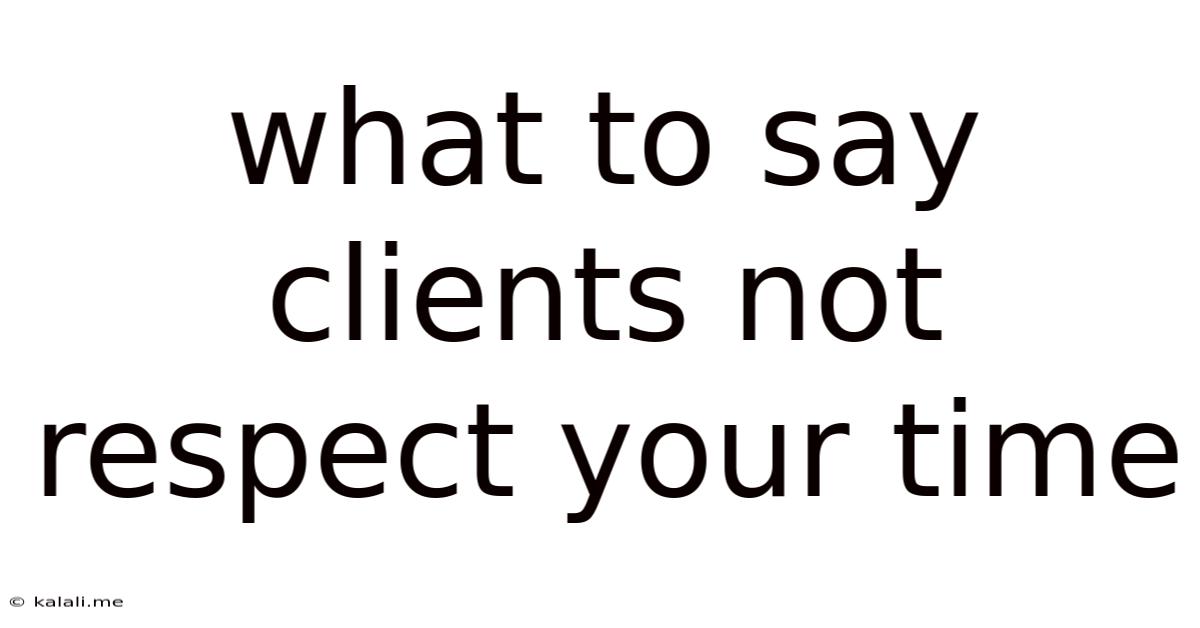What To Say Clients Not Respect Your Time
Kalali
Jun 10, 2025 · 3 min read

Table of Contents
What to Say When Clients Don't Respect Your Time
Setting boundaries is crucial for freelancers and business owners. Respecting your time means respecting your worth. But what happens when clients consistently disregard your schedule and boundaries? This article will provide you with strategies and scripts for addressing clients who don't respect your time, helping you maintain professional relationships while protecting your valuable hours. It’s essential to address these issues proactively to avoid burnout and maintain a healthy work-life balance.
Understanding the Root of the Problem
Before confronting the client, try to understand why they might be disrespecting your time. Are they unaware of your schedule? Do they have unrealistic expectations? Are they experiencing a crisis? Identifying the underlying cause can help you tailor your response and find a mutually beneficial solution. Sometimes, it's simply a matter of miscommunication or a lack of clarity on your processes.
Setting Clear Expectations from the Start
Proactive communication is key. Prevent time-wasting issues before they arise by:
- Clearly defined working hours: State your availability upfront, including response times.
- Project timelines and deadlines: Establish realistic deadlines and stick to them. Include potential delays due to client feedback turnaround times.
- Communication protocols: Outline preferred communication methods (email, phone, etc.) and response times. For instance, specify that you only check emails during specific hours.
- Contractual agreements: Include clauses outlining penalties for missed deadlines or excessive requests outside agreed-upon parameters. This adds a layer of professionalism and accountability.
- Pricing structure clarity: A transparent pricing structure that factors in your time prevents clients from requesting excessive revisions or extra work without additional compensation.
Addressing the Issue Directly
If despite your best efforts, a client consistently disregards your time, it's time for a direct conversation. Here are some phrases you can adapt to your situation:
- "I've noticed we've had a few instances where deadlines have been missed or requests have come in outside our agreed-upon timeframe. To ensure I can deliver the best possible work, and to maintain a sustainable workflow, it's crucial that we stick to our established schedule." This approach is gentle yet firm, highlighting the impact on your work quality.
- "I value our working relationship, but I need to prioritize my time effectively. Going forward, please submit all requests by [time/day] to allow for efficient scheduling." This sets clear expectations moving forward.
- "While I'm happy to help, responding to urgent requests outside of my scheduled hours will incur an additional fee. Let's discuss how we can best manage our communication to avoid this in the future." This is crucial for establishing your worth and discouraging last-minute requests.
- "I understand you're under pressure, but consistently exceeding our agreed-upon hours isn't sustainable. Let's review the project scope to ensure it aligns with the allotted time." This shows empathy while directly addressing the problem.
Handling Difficult Conversations
Some clients might resist. Remain calm, professional, and reiterate your boundaries. Be prepared to offer solutions. Perhaps you can suggest alternative project management tools, schedule regular check-in calls, or adjust the project scope. Remember, it’s not personal; it's about managing your workload effectively. If the behavior continues despite your efforts, consider the possibility of ending the client relationship.
Protecting Your Time: A Long-Term Strategy
Ultimately, protecting your time is an ongoing process. Regularly review your processes, refine your communication strategies, and reassess your boundaries. Learning to say "no" to additional work or requests that don't align with your capacity is critical. Prioritizing self-care and setting healthy boundaries are essential for long-term professional success and wellbeing. Remember, your time is valuable, and it's okay to prioritize it.
Latest Posts
Latest Posts
-
If I Was Born In 1985 How Old Am I
Jul 01, 2025
-
How Many Quarters Are In An Ounce
Jul 01, 2025
-
How Many Times Does 11 Go Into 40
Jul 01, 2025
-
Elvis Presley Gospel One Pair Of Hands
Jul 01, 2025
-
What Is The Fine For Killing A Buzzard
Jul 01, 2025
Related Post
Thank you for visiting our website which covers about What To Say Clients Not Respect Your Time . We hope the information provided has been useful to you. Feel free to contact us if you have any questions or need further assistance. See you next time and don't miss to bookmark.